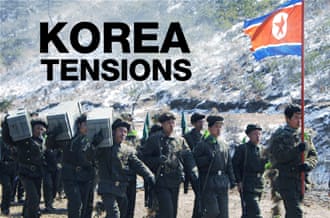Kerry lands in Seoul as tensions simmer |
||
|
John Kerry, the US secretary of state, has arrived in South Korea as tension with its northern neighbour continues. Kerry's three-day visit, which began on Friday, will also take him to China and Tokyo. The trip comes as Washington tries to press China to deliver a "tough" message to North Korea to rein in its nuclear programme and belligerent rhetoric, a US official said. "We really want them to ... carry some tough messages to Pyongyang" on denuclearisation, the official told reporters travelling with Kerry. Kerry also wanted to convey an unambiguous message in Seoul and Tokyo that "we are prepared and that alliance matters [and] that we will defend them," the official, who spoke to reporters on condition of anonymity, added. The trip is Kerry's first to the region since taking office on February 1 and he hopes to persuade China to use its economic and diplomatic leverage to try to temper North Korea's behaviour. Al Jazeera's Marga Ortigas, reporting from Seoul, said Kerry would meet South Korea's foreign minister and discuss the tensions. Kerry will also be visiting US troops, "re-affriming the ties" between the two countries, said our correspondent. She said both the US and South Korea were conducting joint military drills which will end at the end of April. "It’s precisely because these joint military exercises continued that North Korea amped up its angry rhetoric. They [North Koreans] have been saying that this is just a ruse to try to plan an invasion of North Korea," she said. North Korea carried out its third nuclear test in February, prompting a fresh UN Security Council sanctions resolution against the impoverished state led by Kim Jong-un, the 30-year-old grandson of its founder. Earlier, Barack Obama, the US president, on Thursday called on North Korea to end its "belligerent approach". Obama's comments came as the Pentagon backed away from an intelligence report which suggested North Korea might have developed nuclear weapons which could be fit onto a ballistic missile. Pentagon spokesman George Little said "it would be inaccurate to suggest that the North Korean regime has fully tested, developed, or demonstrated the kinds of nuclear capabilities referenced in" the intelligence report. The statement came after a lawmaker read out the findings of a Defence Intelligence Agency (DIA) report at a congressional hearing earlier on Thursday that appeared to signal a shift in Washington's view of North Korea's nuclear programme. The DIA assessment said US analysts had "moderate confidence the North currently has nuclear weapons capable of delivery by ballistic missiles" but that the reliability of the weapons was "low". The intelligence report marked the first time the US government had suggested North Korea may have succeeded in a years-long quest to miniaturise a nuclear device so that it could be placed on a missile. 'Never demonstrated' Defence secretary Chuck Hagel and General Martin Dempsey, the US military's top officer, appeared caught off-guard when the report's findings were disclosed at a hearing of the House Armed Services Committee.
A senior US official, who spoke on condition of anonymity, told the AFP news agency that the administration had not changed its evaluation that Pyongyang was still not at a point where it could deliver a nuclear warhead on a ballistic missile. "The North Koreans have never demonstrated this capability and we don't believe they are able to now," the official said. The confusion over the report came against the backdrop of mounting tensions on the Korean peninsula, with Pyongyang issuing bellicose threats and preparing to possibly launch medium-range missiles. The Pentagon, which has bolstered missile defences around the Korean peninsula, said it was closely watching North Korea amid speculation the regime would fire conventional missiles in the run-up to national celebrations on April 15th. "The United States continues to closely monitor the North Korean nuclear program and calls upon North Korea to honor its international obligations," Little said. 'Belligerent approach' Obama addressed the tensions after a meeting with Ban Ki-moon, the UN chief, in the Oval Office. He said "nobody wants to see a conflict" with the North, but that the United States was ready to take necessary measures to defend itself. "We both agree that now is the time for North Korea to end the kind of belligerent approach that they've been taking," Obama said. "It's important for North Korea, like every other country in the world, to observe basic rules and norms." While the US president emphasised that Washington would "continue to try to work to resolve some of those issues diplomatically," he made it clear that the United States would be ready to face any eventuality and defend its allies. "The United States will take all necessary steps to protect its people and meet our obligations under our alliances in the region," Obama said. Ban, who is from South Korea, said he was "deeply concerned... by the continuing tensions on the Korean peninsula" and hailed what he called Washington's "measured response" to the litany of threats issued by Pyongyang. "We hope that border countries including China, who may have influence on North Korea, can exercise their leadership and influence so that this situation will be resolved peacefully," the UN chief said. Earlier Thursday, G8 foreign ministers, including Kerry, strongly condemned Pyongyang over its nuclear program, warning it would face further sanctions in the event of a missile launch. |
Friday, 12 April 2013
Kerry lands in Seoul as tensions simmer
Subscribe to:
Post Comments (Atom)

No comments:
Post a Comment